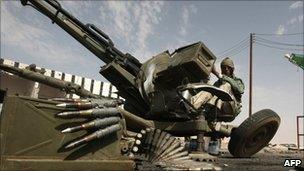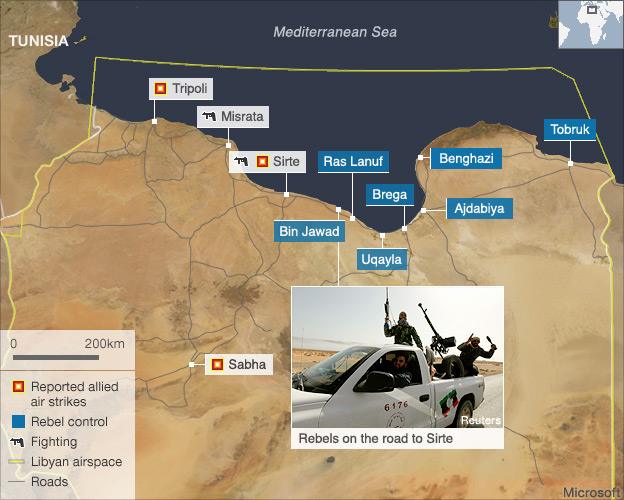Libya air strikes go on until Gaddafi climbdown - US
- Published
Hillary Clinton: "We have prevented a potential massacre"
Allied strikes on Libya will continue until its leader, Muammar Gaddafi, meets UN terms, US Secretary of State Hillary Clinton has said.
She spoke after 40 delegations met in London to discuss the next steps for Libya amid UN-backed military action.
Foreign Secretary William Hague said the coalition has been "widened and deepened" on an "important day".
Meanwhile pro-government forces are intensifying their attacks on Libyan rebels, driving them back.
The BBC's Nick Springate says the rebels have lost one of the towns they previously captured - Bin Jawad - and most have now fled even further east past the town of Ras Lanuf.
Misrata, closer to Tripoli, has also come under heavy attack and blasts have been reported in the capital.
On Tuesday, RAF Tornados, flying from their base in southern Italy, fired missiles at an armoured vehicle and two pieces of artillery near Misrata. They are believed to have been destroyed.
Mrs Clinton said action from the allies would continue until Col Gaddafi met UN terms, stopped attacking civilians and pulled back his forces.
She added that military means alone would not force Col Gaddafi out after 42 years in power, and that further sanctions and diplomatic pressure were needed.
"All of us must continue to increase the pressure on and deepen the isolation of the Gaddafi regime through other means as well," she said.
She added that in one week allies had prevented a potential massacre, established a no-fly zone and stopped an advancing army.
Mrs Clinton told reporters there had been no talk about arming rebels.
However, she suggested that it would be legal to arm them.
"It is our interpretation that (UN Security Council resolution) 1973 amended or overrode the absolute prohibition on arms to anyone in Libya, so that there could be a legitimate transfer of arms if a country should choose to do that," she told reporters.
The BBC's political editor, Nick Robinson, said he understood the UK government also agreed arming the rebels would be legal "in certain circumstances".
Mrs Clinton's comments come as the US steps back from its lead role in the mission and hands over authority to Nato.
Tuesday's conference brought together all members of the coalition in the military operation, as well as the UN, Nato, the African Union and Arab League.
Col Gaddafi sent an open letter to the conference, describing the Western-led air strikes as "barbaric".
After the meeting, the chairman - Mr Hague - outlined points agreed by participants:
Col Gaddafi and his regime have completely lost legitimacy and will be held accountable for their actions
To continue their efforts until there has been a ceasefire, a halt to all attacks on civilians and full humanitarian access to those in need
To consider further sanctions
To establish a contact group, chaired by Qatar, to co-ordinate support for Libya
The Libyan people must be free to determine their own future
Humanitarian provision must be made for 80,000 displaced people
"We are united in seeking a Libya that does not pose a threat to its own citizens, the region or more widely; and in working with the people of Libya as they choose their own way forward to a peaceful and stable future," Mr Hague said.
He added that Sweden had agreed to join Nato military operations in Libya, supplying eight fighter planes to patrol the no-fly zone.
Other countries, which he declined to name, were discussing what contribution they could make, he said.
In the meantime, Adm James Stavridis, a leading US and Nato commander, has told the US Senate that intelligence reports had showed "flickers" of a possible al-Qaeda presence among the Libyan opposition.
Asked about his comments, Mrs Clinton said the allies were still "getting to know" the opposition.
Snipers
Opening the meeting, UK Prime Minister David Cameron said Col Gaddafi was carrying out "murderous attacks" on the city of Misrata.
"Gaddafi is using snipers to shoot people down and let them bleed to death in the street. He's cut off food, water and electricity to starve people into submission and he is harassing humanitarian ships that are trying to get into the port to do what they can to relieve their suffering.

Rebels are being forced to abandon seized towns as government troops attack
"He continues to be in flagrant breach of the UN Security Council resolution. That is why there has been such widespread support among the Libyan people and in the wider Arab world for the action that we're taking. It has saved lives and it is saving lives."
He said his message to the people of Libya was that there were "better days ahead".
UN Secretary General Ban Ki-moon told delegates he would lead efforts to co-ordinate the international effort to map out Libya's future.
"The transition to a democratic government and society will take time and the support of us all. The United Nations is ready and willing to help the people of Libya in this transition," he said.
New constitution
The Libyan rebels' Transitional National Council was not invited to the conference itself, but its envoy Mahmoud Jibril and other officials held talks on the sidelines.
Spokesmen for the council said its role was to facilitate a transition - once Col Gaddafi had gone - until a new constitution had been crafted by the Libyan people.
Arab countries Qatar, Iraq, Jordan, Morocco, Lebanon, Tunisia and the United Arab Emirates were represented at the meeting. Nato Secretary General Anders Fogh Rasmussen and UN Special Envoy for Libya Abdelilah Mohamed al-Khatib also attended.
But Russia, which says the action has gone beyond the terms of the UN resolution that authorised it, did not attend.
The coalition military action is aimed at enforcing a no-fly zone over Libya and protecting civilians from attacks by forces loyal to Col Gaddafi. It has denied air strikes are meant to provide cover for a rebel advance.
